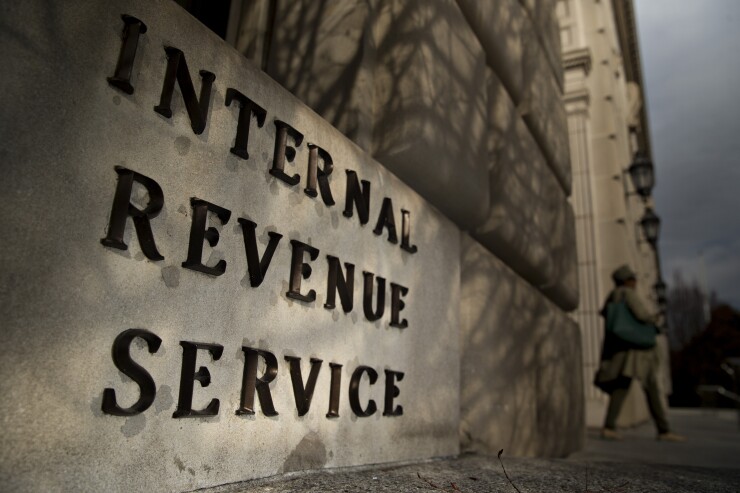The Internal Revenue Service posted information about how to correctly compute the new exclusion on a portion of unemployment income as Congress pushes the IRS for further tax-filing relief.
The guidance, which the
The provision should help millions of taxpayers who lost their jobs last year due to the pandemic. While many states do allow taxpayers to withhold taxes from their unemployment benefits, not all do, and many taxpayers either don’t know they can withhold the money or can’t afford to do it. Many taxpayers are surprised when they learn that unemployment benefits are taxable and find out to their dismay about the requirement when they do their taxes. The new law will be welcome news to many taxpayers who were hoping to get a tax refund for the full amount instead of owing taxes on their unemployment benefits. However, for those who filed early this year, the IRS said taxpayers should not file amended tax returns, which may save some extra work for tax preparers during what is already shaping up to be another hectic tax season.

"The IRS strongly urges taxpayers to not file amended returns related to the new legislative provisions or take other unnecessary steps at this time," said the IRS in a separate
IRS and Treasury officials said during a press conference Monday that this statement was still operable, but they're working on further guidance for taxpayers who have already filed tax returns under the assumption that the full unemployment benefits were taxable before the $10,200 exclusion was signed into law as part of the American Rescue Plan. The IRS is focusing on sending out the third round of Economic Impact Payments as quickly as possible. That process began over the weekend. The officials said they would work on getting the additional guidance as quickly as possible for taxpayers who have already filed returns listing unemployment benefits.
The rules are a little complicated for married taxpayers, but both spouses will be able to benefit from the exclusion. “If you are married, each spouse receiving unemployment compensation doesn’t have to pay tax on unemployment compensation of up to $10,200,” said the IRS. “Amounts over $10,200 for each individual are still taxable. If your modified AGI is $150,000 or more, you can’t exclude any unemployment compensation.”
The IRS said the exclusion should be reported separately from unemployment compensation. The agency recommended taxpayers and preparers use the updated instructions and an upcoming Unemployment Compensation Exclusion Worksheet to calculate their exclusion and the amount to be entered on Schedule 1, lines 7 and 8. The instructions for Schedule 1 (Form 1040), line 7, Unemployment Compensation, and line 8 on the worksheet, have been updated to reflect the latest changes, and the
Another wrinkle is that identity thieves have been filing unemployment claims for the enhanced unemployment benefits using stolen personal information, and there have been reports around the country of taxpayers who weren’t unemployed receiving incorrect 1099-G forms from their state. Last month, members of the tax-writing House Ways and Means Committee asked the IRS to help taxpayers with the problem (
The IRS guidance posted Friday doesn’t specifically address this problem, but it does note that taxpayers may receive the Form 1099-G from their state and explains what to do with it. However, the same day the IRS posted guidance about the $10,2000 exclusion, a group of Democrats in the Senate and the House asked the IRS and the Treasury Department to help spread the word about the tax exclusion to help more taxpayers take advantage of it, and avoid the need for them to file an amended tax return to claim it if they have already filed their taxes this year. Senate Majority Whip Dick Durbin, D-Illinois, and Rep. Cindy Axne, D-Iowa, led a group of colleagues in urging Treasury Secretary Janet Yellen and IRS Commissioner Charles Rettig to make every effort to ensure that people who received unemployment compensation in 2020 are able to utilize the tax exclusion. In a letter to Yellen and Rettig, they pointed out that the exclusion could reduce the tax bills of unemployed workers by over $1,000.
“We encourage you to determine whether it would be feasible for the IRS to automatically adjust taxable income and deliver refunds without requiring an amended tax return from eligible taxpayers who have already filed,” they wrote. “If this is not possible, we urge you to provide clear, accessible information to ensure eligible taxpayers who have already filed for 2020 can file an amended return as quickly and easily as possible. Treasury and the IRS should conduct a robust public awareness campaign to ensure that individuals who received unemployment benefits in 2020 are aware of this tax exclusion and understand the actions that need to be taken to receive it. This may be especially important for those who could be eligible for a larger Earned Income Tax Credit or Child Tax Credit with this exclusion, or are newly eligible for these credits.”
They noted that the Labor Department estimates that more than 20 million Americans are still receiving some form of unemployment benefits.





